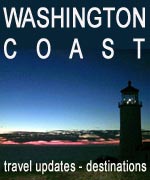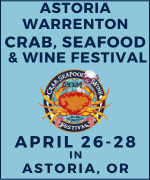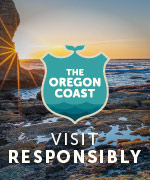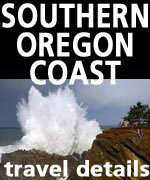Three Whales Hit Oregon Coast Sands: Causes of Death Released
Published 01/21/23 at 6:10 PM
By Oregon Coast Beach Connection staff
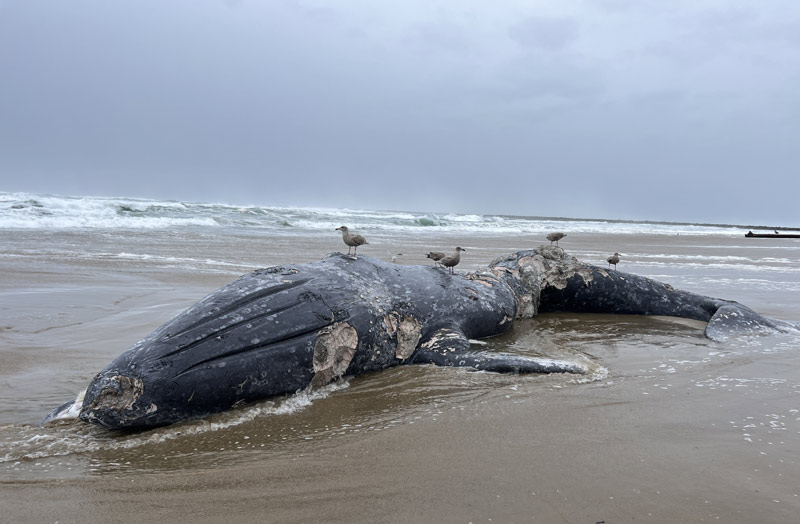
Includes exclusive listings; some specials in winter
In Cannon Beach:
Includes rentals not listed anywhere else
In Manzanita, Wheeler, Rockaway Beach:
Some specials for winter
In Pacific City, Oceanside:
Some specials for winter
In Lincoln City:
Some specials for winter
In Depoe Bay, Gleneden Beach:
Some specials for winter
In Newport:
Look for some specials
In Waldport
Some specials for winter
In Yachats, Florence
Some specials for winter
Southern Oregon Coast Hotels / Lodgings
Reedsport to Brookings, places to stay; winter deals
(Warrenton, Oregon) – In just over a week, three deceased whales made it onto Oregon coast beaches and each had a story to tell scientists by the way they died. (Photo courtesy Jim Rice / Hatfield Marine Science Center: the gray whale near Reedsport)
The first washed up near Winchester Bay on the south Oregon coast. It had died from injuries sustained by orca attacks. The second was a large sperm whale at Fort Stevens State Park, which had died due to a ship strike. The third was a newborn gray whale that died shortly after birth.
Crews from various Marine Mammal Stranding Network groups responded to each one, with part of NOAA (National Oceanic and Atmospheric Administration) Fisheries, biologists from Portland State University and a group from the Seaside Aquarium attending to the sperm whale and the baby whale.
The first incident happened January 11 when a deceased, adolescent male gray whale rolled onto the beach south of the Umpqua River jetties near Winchester Bay. Jim Rice, from Newport's Hatfield Marine Science Center and with the Marine Mammal Stranding Network, responded. He said he examined the whale on January 13 and quickly discovered how it died.
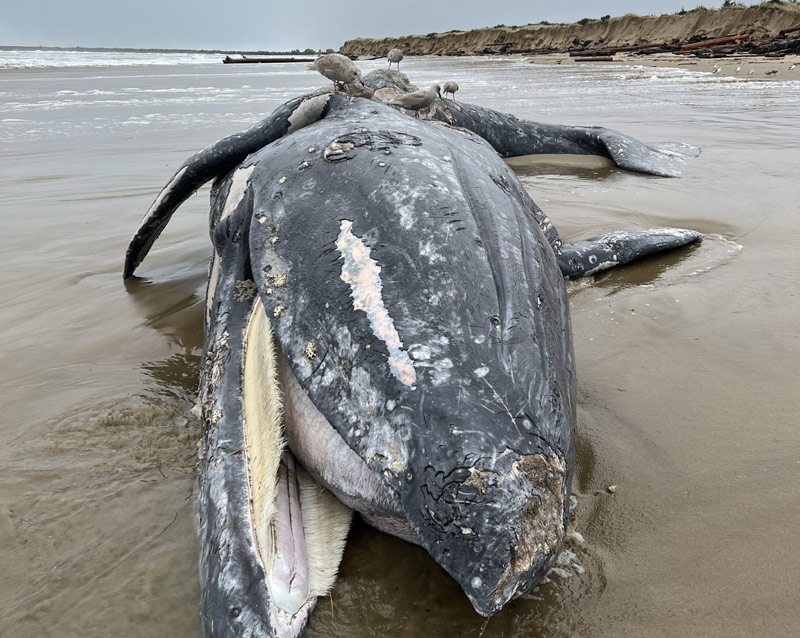
Courtesy Jim Rice
“It is found to have clear signs of predation by killer whales,” Rice told Oregon Coast Beach Connection. “It was moderately decomposed at the time it stranded, indicating that it had been dead for several days before coming ashore.”
Rice added it's much more decomposed now.
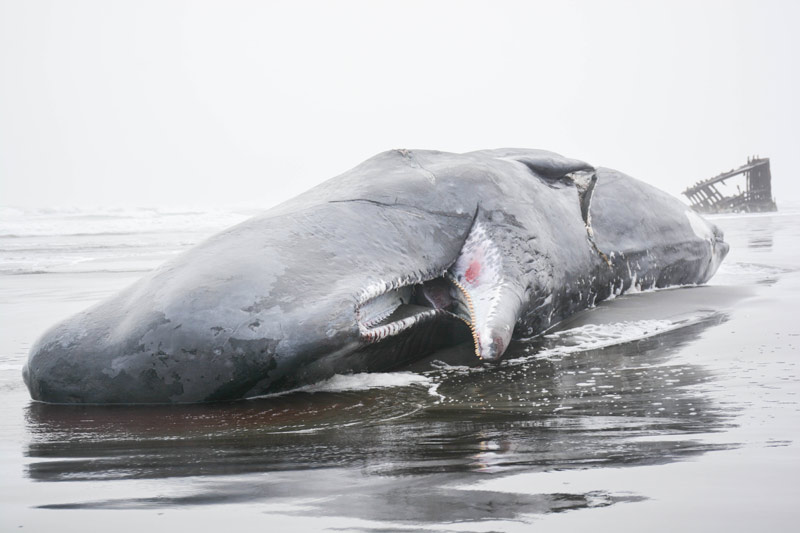
Courtesy Seaside Aquarium
Next was the 40-foot sperm whale at Fort Stevens State Park, landing right within sight of the wreck of the Peter Iredale, hitting the sands on January 15. This one caused a major media stir, that in turn brought even more people out to the famed north Oregon coast beach to see the stranded behemoth.
Immediately, crews from NOAA Fisheries and Seaside Aquarium noted the large scarrings along the whale and suspected that it had died from an encounter with a ship's propeller. A later necropsy revealed that to be the case. Large Sperm Whale Strands on N. Oregon Coast near Iredale Shipwreck; Cause of Death Unknown (Video)
Seaside Aquarium, which responds to stranded marine life all the time, said this was a rather unusual find as it was only about the fifth or sixth time they'd seen a sperm whale in their jurisdiction area in the last 30 years. The aquarium deals with the northern Oregon coast and southern Washington coast into the Long Beach Peninsula, so there could be more south of that range that other agencies dealt with.
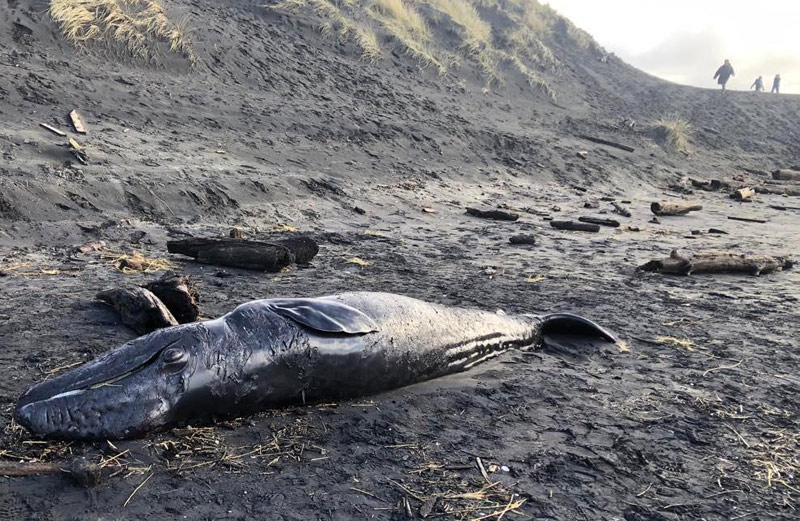
Courtesy Rachel Sip
Just a few days later, a baby gray whale stranded just 100 yards from the previous sperm whale: it is unusual to have two wash up in the same spot so close to each other.
The baby whale also brought in a great deal of attention as well. A necropsy was performed there on the spot within two days, and according to NOAA Fisheries' spokesman Michael Milstein the cause of death was a case of a newborn not surviving. It died shortly after birth.
“The examination determined that the female whale was not stillborn, and had apparently begun nursing but died soon after birth,” Milstein said. “The umbilical cord was gone, but its wound had not yet healed. The team found no signs of trauma or other obvious cause of death, but took numerous tissue, blood, and fluid samples that will be analyzed for clues about why the young whale did not survive.” Second Deceased Whale Washes Up in Same N. Oregon Coast Spot
All three corpses - including the gray whale at Reedsport - were left on the beach with hopes the king tides or other high tides will take it out to sea again. There, the bodies will hopefully sink to the bottom and provide nutrients for other life in the ecosystem. Oregon State Parks and Recreation Department (OPRD) may have them removed from the beach if that does not work.
Seaside Aquarium's Keith Chandler told Oregon Coast Beach Connection it's also hoped that predators may gobble up the remains. He said he'd been out to Fort Stevens today (Saturday) during high tide and watched the corpses get tossled, which may mean they're on their way out.
So why the sudden run of strandings? Tiffany Boothe of Seaside Aquarium said it is a major surprise to her as well, but it all makes sense considering current conditions.
“When the winds blow out of the west, we often see animals that have been floating out at sea wash up on the beach,” she said. “Depending on the winds and currents it is not unusual for multiple animals to wind up washing ashore in the same place.”
Indeed, around the whale itself you can see a whole lot of tiny ocean debris. Recent wild waves have deposited much on the Oregon coast lately. MORE PHOTOS BELOW
Oregon Coast Hotels for this event - South Coast Hotels - Where to eat - Maps - Virtual Tours
Cannon Beach Lodging
Nehalem Bay Lodgings
Manzanita Hotels, Lodging
Three Capes Lodging
Pacific City Hotels, Lodging
Lincoln City Lodging
Depoe Bay Lodging
Newport Lodging
Waldport Lodging
Yachats Lodging
Oregon Coast Vacation Rentals
Oregon Coast Lodging Specials
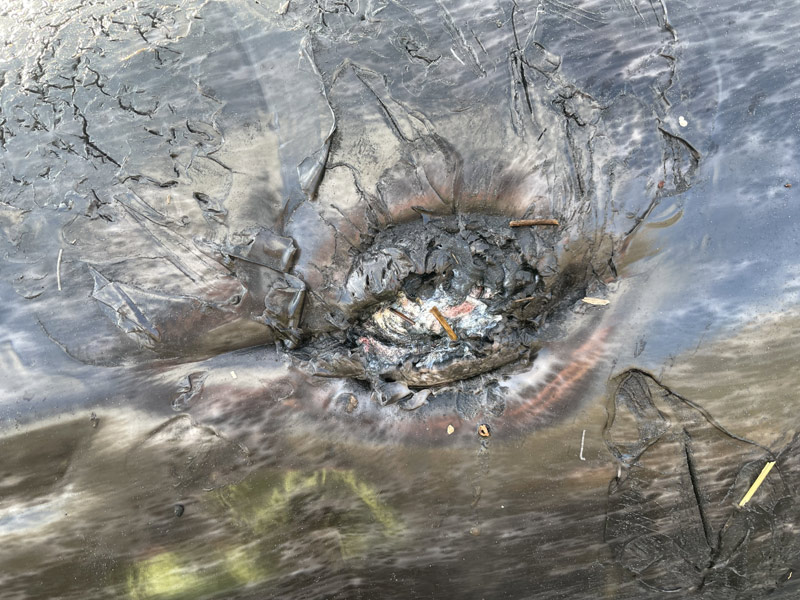
Baby whale, courtesy Seaside Aquarium
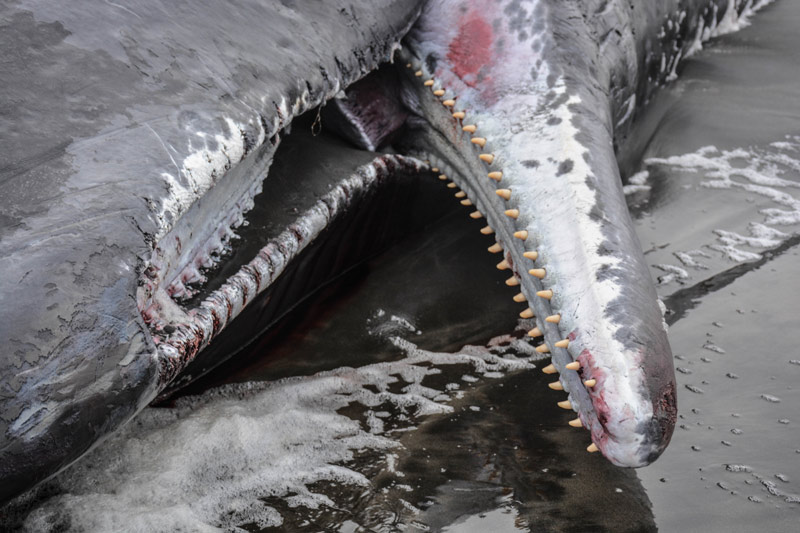
Sperm whale, courtesy Seaside Aquarium
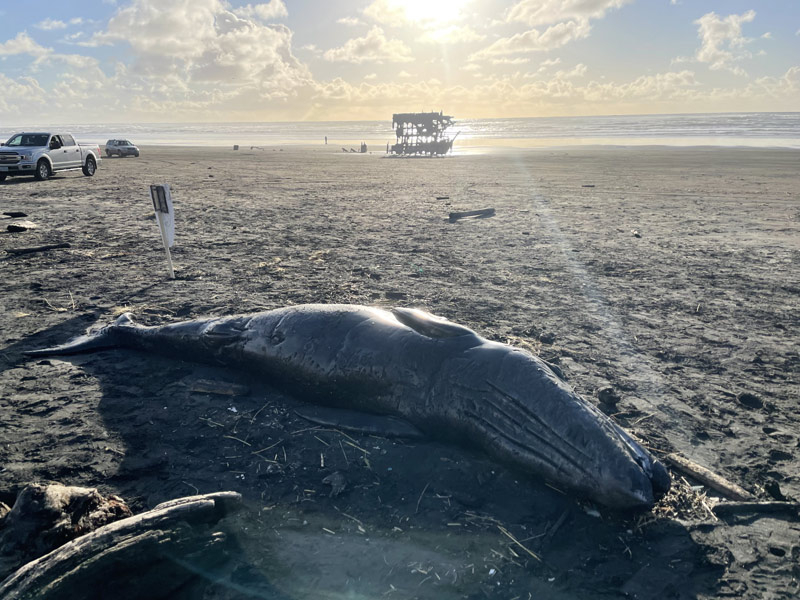
Baby whale, courtesy Seaside Aquarium
More About Oregon Coast hotels, lodging.....
More About Oregon Coast Restaurants, Dining.....
 Andre' GW Hagestedt is editor, owner and primary photographer / videographer of Oregon Coast Beach Connection, an online publication that sees over 1 million pageviews per month. He is also author of several books about the coast.
Andre' GW Hagestedt is editor, owner and primary photographer / videographer of Oregon Coast Beach Connection, an online publication that sees over 1 million pageviews per month. He is also author of several books about the coast.
LATEST Related Oregon Coast Articles
The move will hopefully initiate federal assistance. Traffic. Tillamook, Portland, Hillsboro, Oceanside, Pacific City
Driver Arrested on Oregon Coast After Narrowly Missing Construction Crew, The...
Driving up to 110 mph on Highway 101, endangering crews before that. Safety
N. Oregon Coast's Highway 6: Why It Was Abruptly Closed for the Day This Weekend
A new roadway arose with more sunken asphalt. Traffic
Police Arrest Man for Breaking Into N. Oregon Coast's Historical Big Red, Usi...
The building had also been robbed of pipes and copper by other thieves. True Crime, Astoria, Warrenton
Two Incidents Today on Oregon Coast: Body Recovery at Devils Churn, Plane Cra...
No ID released on the body; no one seriously hurt in the plane crash. Safety, weather
Oregon Coast's First 'Reviews' Came 220 Years Ago: Lewis and Clark in January
1806 here made its mark in history from Washington, Astoria, Warrenton to Seaside and Cannon Beach
Seaside Event Brings Sea Rescue History of Oregon / Washington Coast To Life
January 29 at 6 p.m. at Seaside Brewing: the precursor to the US Coast Guard. Seaside events
UPDATED: Sneaker Wave Alerts and High Surf Advisories for North Oregon Coast,...
From Florence to the very edges of Washington. weather
Back to Oregon Coast
Contact Advertise on Oregon Coast Beach Connection
All Content, unless otherwise attributed, copyright Oregon Coast Beach Connection. Unauthorized use or publication is not permitted





